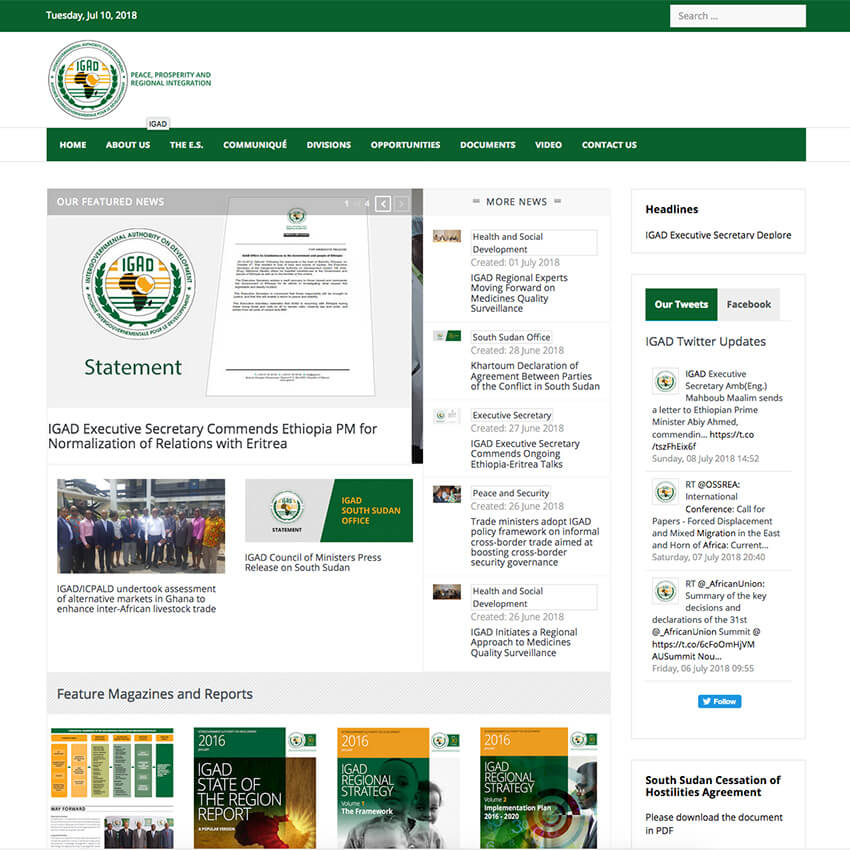IGAD was created in 1996 to supersede the Intergovernmental Authority on Drought and Development(IGADD), which was founded in 1986. This followed the recurring and severe drought and other natural disasters between 1974 and 1984 that caused widespread famine, ecological degradation and economic hardship in the Eastern Africa region. Although individual countries made substantial efforts to cope with the situation and received generous support from the international community, the magnitude and extent of the problem argued strongly for a regional approach to supplement national efforts.
In 1983 and 1984, six countries in the Horn of Africa (Djibouti, Ethiopia, Kenya, Somalia,Sudan and Uganda) took action through the United Nations to establish an intergovernmental body to collectively combat drought and desertification in the region. The Assembly of Heads of State and Government met in January 1986 to sign the agreement that officially launched IGADD with headquarters in Djibouti. The State of Eritrea became the seventh member after attaining independence in 1993 and South Sudan joined in 2011.
In April 1995 in Addis Ababa, the Assembly of Heads of State and Government made a declaration to revitalize IGADD and expand cooperation among Member States. On 21st March 1996 in Nairobi, the Assembly signed “Letter of Instrument to amend the IGADD Charter” establishing the revitalized regional organization with a new name, “Intergovernmental Authority on Development”. IGAD with expanded areas of regional cooperation and a new organizational structure was launched during the Summit of the Heads of State and Government on 25th November 1996 in Djibouti.
The Vision
To be the premier regional organization for achieving peace, prosperity and regional integration in the IGAD region
The Mission
To assist and complement the efforts of the Member States through increased cooperation to achieve:
- Food security and environmental protection;
- Promotion and maintenance of peace and security and humanitarian affairs; and
- Economic cooperation and integration.
The Objectives
Working with the Member States and the development partners to:
- Promote joint development strategies and gradually harmonize macro-economic policies and programmes in the social, technological and scientific fields;
- Harmonize policies with regard to trade, customs, transport, communications, agriculture, and natural resources, and promote free movement of goods, services, and people within the region;
- Create an enabling environment for foreign, cross-border and domestic trade and investment;
- Achieve regional food security, as well as encourage and assist efforts to collectively combat drought and other natural and man-made disasters and their natural consequences;
- Initiate and promote programmes and projects to achieve regional food security and sustainable development of natural resources and environmental protection;
- Develop and improve a coordinated and complementary infrastructure, in the areas of transport, telecommunications and energy in the region;
- Promote peace and stability, as well as create mechanisms for the prevention, management and resolution of inter-State and intra-State conflicts in the region through dialogue;
- Mobilize resources for the implementation of emergency, short-term, medium-term and long-term programmes within the framework of regional cooperation;
- Facilitate, promote and strengthen cooperation in research development and application in science and technology; and
- Promote and realize the objectives of the African Economic Community.
Policy Organs
IGAD is comprised of four hierarchical policy organs:
1. THE ASSEMBLY OF HEADS OF STATE AND GOVERNMENT; The Summit is the supreme policy making organ of the Authority. The Summit determines the objectives, guidelines and programmes for IGAD and ordinarily meets once a year. A Chairman is elected from among the Member States on a rotational basis.
2. THE COUNCIL OF MINISTERS; The Executive Council is composed of the Ministers for Foreign Affairs and one other Focal Minister designated by each Member State. The Council formulates policy, approves the work programme and annual budget of the Secretariat.
3. THE COMMITTEE OF AMBASSADORS is comprised of Ambassadors or Plenipotentiaries accredited to the country of IGAD Headquarters, i.e. Djibouti. The Committee convenes as often as the need arises to advise and guide the Executive Secretary.
4. THE SECRETARIAT is headed by an Executive Secretary appointed by the Assembly of Heads of State and Government for a term of four years renewable once. The Secretariat assists Member States in formulating regional projects in the priority areas, facilitates the coordination and harmonization of development policies, mobilizes resources to implement the projects and programmes approved by the Council and reinforces national infrastructures necessary for implementing regional projects and policies.

